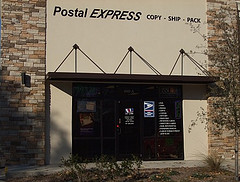Congress last week began hearings about whether to discontinue Saturday mail delivery, close local branches and other measures to try to balance the postal service’s budget. On the national news last night was a story about how a small town in Maine fought to retain its lone street mailbox. I say desperate times call for much bigger measures, and my suggestion is to sell the entire USPS outfit to Netflix, lock, stock, and … Well, you don’t want to say certain words around postal employees – at least until they become Netflix staffers. More on that in a moment.
It isn’t so far-fetched when you start to think about the possibilities. After all, Netflix is keeping the USPS afloat with more mailings of DVDs than McDonalds sells burgers. They have more than 50 distribution centers around the country, all of them in locations that are more secret than Dick Cheney’s bunker. They certainly understand how to run a distribution network, they have the machinery and the personnel. Plus, something that would warm the cockles of my Republican wife’s heart, I can’t believe that I am saying this but having a truly private mail carrier might actually bring some economic sense to our mail system. How would this look? Here are my suggestions: First all, all mail would be one size and have to be sent in those familiar red mailers. That would mean that anything larger would have to use some other carrier, such as Fedex or UPS. International mail? Same thing. Magazines? Well, this is hard for an old magazine editor like myself, but they will have to change to the Netflix form factor if they still want to be mailed. Junk mail? Same deal.
Standardization is key. No more post cards. If it doesn’t fit in a mailer, you can’t mail it. Next, we eliminate potage stamps. Since we all will be using the standard mailers, we have standard postage. You buy the mailer and pay for the postage right then and there. Forget about metering based on weight: whatever you can cram into one of those envelopes is what you get to send. This obviates the need to run local post offices: if you need to mail something bigger, you can go on down to Kinkos or the local UPS store. They give better customer service there anyway. No more postage meters, but Pitney Bowes has been on the decline for years anyway. And while we are at, we should eliminate business delivery of postal mail. Don’t need it. You want to send something, use one of the other private carriers and get it there overnight. I recall a funny story a few years ago, when I was doing some work for a publishing firm and mailed in my signed contract. My editor kept saying that he never received the contract, because he never thought to ask where his actual postal mailbox was – there was little point because he never got anything via USPS that he cared about. The only thing that I get these days are checks, and we might as well move towards electronic payments anyway.
Some of my clients now do direct deposit to my bank account, and I wish more did. Netflix is a good choice to run the USPS for one other reason: it has an amazing employee base. You couldn’t pick something that was more the polar opposite of the feather-bedded, anti-customer oriented, highly unmotivated, hyper regulated postal system if you tried. How so? There is no vacation or hourly time card tracking policy at Netflix. There is also no specified uniforms or other dress code policy there but no one has come to work naked lately. Their entire T&E policy is “Act in Netflix’s Best Interests” and not much more than that. I think that says a lot about how much a company can trust its employees, unlike many firms that make you take odd flights to save a few dollars that consume hours of your time, or jigger your expense report so you can get almost reimbursed for your actual out-of-pocket expenses. The lesson is that you don’t need detailed policies for everything. You can see the details of this for yourself if you are interested here:
http://www.slideshare.net/reed2001/culture-1798664 I know having Netflix run the postal system is probably a fantasy. But it is fun to dream, and have hopes, right?

